Slaughter in San Francisco (1974)
Directed by: Lo Wei
Written by: Chang Yung-hsiang, Lo Wei
Starring: Chuck Norris, Dan Ivan, Sylvia Chang, Wong Tao
AKA YELLOW FACED TIGER, HUANG MIAJN LAO HU, KARATE COP
HONG KONG
AVAILABLE ON BLU-RAY: 19TH FEBRUARY, from EUREKA ENTERTAINMENT
RUNNING TIME: 106 mins / 89 mins
REVIEWED BY: Dr Lenera
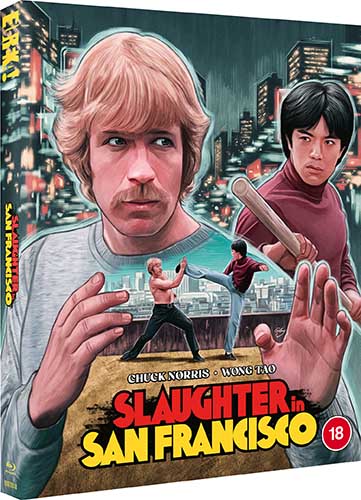
San Francisco police officers Wong Kwan and Blackie save a girl named Sylvia from being raped by two men, but she refuses to press charges and claims that the altercation was all in fun. In retribution for their arrest, the crooks kidnap Blackie and nearly beat him to death before Wong manages to come to his partner’s rescue, killing one of them. For this, he’s kicked out of the force but still keeps in touch with Blackie. After serving his sentence, Wong takes a job as a waiter where he turns down an offer to work for one of the crooks he beat up. Then Blackie is killed by one of a group of bank robbers, and his captain Newman blames a Chinese doctor and his wife….
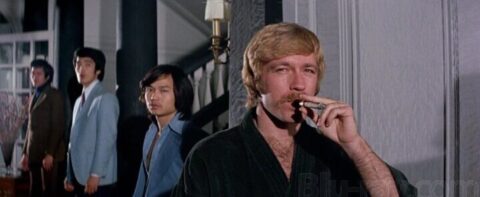
I was thinking a couple of years ago while typing my Way Of The Dragon review that this site needs more Chuck Norris, the man who’s so hard that he can….okay I won’t go into all that. Joking aside, Eureka Entertainment have now got the ball rolling with Slaughter In San Francisco, another Hong Kong effort written and directed by Lo Wei of The Big Boss and Fist Of Fury fame, though I ought to tell you right now – Chuck has little screen time, and is again playing a bad guy who has to be beaten by our hero, here a guy named Wong Tao who’s clearly being used to be the “next” Bruce Lee but of course can’t compare with the real deal. Folks going to see the 1981 US cinema release, put out to cash in on Norris’s popularity at the time, must have been disappointed. This version was also greatly cut down from Yellow Faced Tiger, the Hong Kong original, and unsurprisingly it’s the superior latter I’m going to focus on in this review, though I will say a few words about the American re-edit later, which is sadly the version which most people will have seen in the West. Yellow Faced Tiger certainly has its action, but it’s not a full-on fight fest, Wei, as he often did, attempting to make something more, with as much emphasis on drama, its plot allowing for several strands to be leaned on, though, as is also often the case, two or three scenes are somewhat redundant, while there’s a lot of carelessness and unintentionally silly stuff which is good to laugh at but which prevents full engagement. Nonetheless the strong racial element helps to keep things interesting, and then there’s the oddity of a Hong Kong film being shot [though neighbouring Daly City was also used a lot] in San Francisco; Shaw Brothers would have probably filmed it all on sound stages, but Golden Harvest liked to go on location, but of course you have to get used to everyone speaking in Mandarin, and oddly none of the landmarks are featured.
Wong Kwan and Blackie [yes he’s African-American, and called John Summer in the shorter cut] are introduced driving off in their police car, checking their badges, smiling and grinning, sometimes at each other, to signify that they love their job. Yes, it’s over the top, but then this is a Hong Kong film from 1974, and such simple, direct providing of information to the audience sticks out more in a modern setting than it does in a period martial arts flick, while you can also chuckle at the theme song, the lyrics going on about this heroic “yellow faced tiger” who’s so heroic that “he never insults, he never can be insulted”. Kwan and Blackie pass two men and a woman; we see the woman wink at either the cops [though they wouldn’t be able to see her do this from where they are] or the audience to signify that she’s up to no good; a half-seen body lying down turns out to be a black woman with her boyfriend. “He’s black, just like you” says Wong to Blackie in a line that can’t help but seem crass today; Blake then replies, “That’s how the girls are nowadays, it’s hip”. Yes, the dialogue is sometimes painful though of course may come across better if you know Mandarin. Screams lead them to cuffing and taking to the station the two thugs who were supposedly attacking the girl whose name is Betty, only for her to say that it was all a prank. Kwan goes home to nobody though has a photograph on the wall of his American dad[!], while Blackie has a wife and daughter. Blackie is lured into a trap where he goes to help open the back of a truck and loads of people come out the back to subdue him. Wife [not many characters are named in this movie] sees it and rings Wong, who arrives incredibly quickly to follow the truck on a his motorbike to a beach where Blackie is having the hell kicked out of him. Wong intervenes but kills one of the assailants and is fired and imprisoned for his trouble.
The film perhaps goes overboard emphasising the friendship between Kwan and Blackie. The two get hammered, but here’s a funny thing; we see Blackie stumbling around very drunk on the street in what looks like mid-morning in what is probably the worst day for night shooting ever, but when a few seconds later he interrupts a robbery, with bank robbers coming out of a sewer[!] and has to both flee and do some fighting, he acts like he’s totally sober! Blackie is killed, though not by a gun despite the villains having one, in a garden belonging to Dr Wu, his wife and their daughter who turns out to be Betty; we don’t get an explanation as to why she, her crook boyfriend and another crook like to pretend she’s being raped. A weird turn on? When Wong comes across her again and asks why she’s like this, she replies that it’s because she’d formed multiple personalities in order to have more experiences – no, I’m not joking. Captain Newman tells the couple that he believes that they’re responsible for the killing, but in actual fact he’s trying to frame them because he’s involved with the criminal gang. Even though Wu offers him some money, he gets them thrown in prison with a bit of police brutality added. Meanwhile the China Association is getting more and more annoyed at the treatment of Chinese in San Francisco, and are about to go and protest, but a lawyer named Chou says that it’s best for him to just go collect evidence and defend Wu in court, though of course Newman isn’t going to take kindly to this guy snooping around and asking questions. Wong is doing his own investigating, which means attacking suspicious characters that he knows in their places of residence, and soon comes across something very interesting indeed. Now where’s Norris in all this, you may ask? He’s Chuck Slaughter, the older brother of Betty’s boyfriend and the leader of the gang, who’s also a martial arts teacher with a bunch of students, but we don’t meet him till over an hour has passed, jamming a cigarette into Wong’s arm.
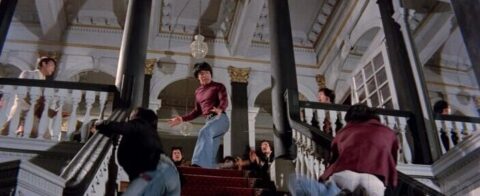
The fights aren’t really notable, are often rather short, and contain awkward edits which suggest that the filming wasn’t quite finished, but are relatively exciting even though showing action from some distance can’t help but make it even more obvious than normal that multiple opponents are awaiting their turn to attack Wong, and are just people pulled off the streets with no experience rather than disciplined and skilled Hong Kong stuntmen. Tao has agility and some serious taekwondo skill, but the latter isn’t made the most of. Tao only really imitates Lee in the second to last fight with Slaughter’s henchmen, but is uninteresting to watch when he’s not fighting. The first real fight on the beach sees Tao battle a group with okay results despite messy choreography. There’s then a considerable gap until Blackie has to flee those robbers, the group comprising some of the same gang [I’m sure this doesn’t count as a spoiler], sometimes fighting some off before finally succumbing. And then there’s another considerable gap, unless you count Tao delivering the odd punch or kick, before Wong chases a guy onto a rooftop where a brief brawl ensures. Then he faces off against Dan Ivan, and it’s an extremely one-sided encounter despite Ivan being pretty skilled, though Tao shows an admirably convincing intensity as he beats the hell out of his opponent. We then think that we’re going to see Wong battle the whole gang way before we do, and the first time is just a skirmish up a hill, with the film seriously losing pace just when you’d expect it to be speeding up. Norris gets to kick a few boards, before, after his henchmen are have seriously failed at what they’ve been told to do, facing off against a previously spade-wielding Wong, and again it’s rather one-sided, if not as much as the Ivan fight, with Norris looking cramped and restricted.
The plot has things in it which don’t make much sense, such as a ridiculous number of coincidences where so much and so many characters are linked. We’re not even sure if everything that Slaughter is up to, despite him being one of those silly, egotistical villains who likes to reveal his villainous activities just before he orders his men to kill him. He first gets to show how bad he really is when he objects to his brother being with a “yellow skinned woman”, then tries to rape her. The racial element reaches its peak with a quite intense moment where Kwan is holding Blackie’s son though it’s obviously his daughter, and the mother demands that he not do so because “my husband was killed by one of you Chinese”, though it’s white people who are generally the worst portrayed, being mostly racist scum. Nonetheless, it’s quite impressive that screenwriters Wei and .Chang Yung-hsiang are happy to look at racial issues if only superficially, which is probably how it should be really. There’s even a brief topless black woman who’s the girlfriend of a Chinese man; elsewhere the exploitation elements aren’t quite as strong as you may expect, with certainly less blood than normal, and two strangulations which aren’t even totally seen, which raises the question as why the BBFC, as inconsistent as ever, felt the need to give this an ’18’ rating, unless the original rating from the film’s first home media release, which would definitely have been an ’18’ back then, has just been retained to save the cost of re-submitting it [it’s astonishing how much the BBFC charge for submissions]. The performing is often typically broad, though Sylvia Chang seems to be trying to make something out of her bizarre character, and co-fight choreographer Lam Ching-yin makes a strong early impression as an assassin.
Wei likes to make scenes of people walking inside last quite a while; the slow rhythm he creates isn’t unappealing but he’s just not very good at speeding things up when you’d think it would be required. The score by Joseph Koo, who’s not the Joseph Koo familiar from many later classic Hong Kong movies [something that I only recently realised] includes guitar-based calmness straight out of an Italian western, blaxploitation funk, dark experimental stuff, and a few seconds of a track [but not the popular main theme] from Ennio Morricone’s soundtrack to A Fistful Of Dynamite. The score generally works well in this terribly uneven picture which has a lot of sloppiness but which still can’t help but entertain. And as for Chuck – you’ll be seeing more of him on this website soon.
Rating: 









SPECIAL FEATURES
Limited Edition O-Card slipcase featuring new artwork by Sam Gilbey [2000 copies]
1080p HD presentation on Blu-ray of “Slaughter In San Francisco”, US export version from a brand new 2K restoration
I imagine that a lot of people who are interested in buying this disc will have already seen Slaughter In San Francisco, which received an absolutely dire UK DVD release from Medium Rare in a version that, for no discernable reason, was even shorter than this one. The cutting down alternates from being fairly smooth to being slapdash, the latter reaching its peak when we omit the short section of Kwan in prison and go straight to him waiting with no sense of the amount of time that’s passed. While the credits emphasise the western cast members and anglicise a lot of the Chinese names [Lo Wei is “William Lowe”], the two main ideas were obviously to speed up the pace, hence the shortening of many scenes and the removal of the two China Council scenes, and to pretend that Chuck Norris was in it more than he actually is by moving some of his scenes to earlier in the movie. To be fair the latter isn’t done too badly, but then you have the dubbing where every Caucasian character is voiced by an American pretending to be English plus one Irishman! The racial material has been toned down, right from the removal of the early shot of Wong’s father’s picture, but then why keep the second, much later, shot with it in? This is undoubtedly an inferior version, but the faster pacing no doubt makes it mor enjoyable for many.
English dubbed mono audio
Brand new feature length audio commentary by Mike Leeder & Arne Venema (US export version)
Leeder’s jokey opening “the legend of Chuck Norris began here” sets the tone of this fabulous commentary where our duo spend much of their time laughing at the movie in question, being in no doubt of its goofy aspects, yet highlighting things that they think are worth being highlighted, along with such facts as the Egyptians [Venema here] starting the odd tradition of pouring liquid, which often means alcohol, over graves. Venema is typically more into talking about things like the filming style, while Leeder is even jokeir than normal, even doing an imitation of Joss Ackland at one point, but this approach suits the film. Leeder says that it did have a 1974 US release, but just a minor one. Tremendous fun, though it seems like the pair haven’t seen the Yellow Faced Tiger version as they don’t mention any of the cuts and alterations in this edit.
1080p HD presentation on Blu-ray of “Yellow Faced Tiger”, the original Hong Kong theatrical version from a brand new 2k restoration
Both versions look almost the same, with vibrant colours, healthy flesh tones, lots of detail, and mostly even grain. However, the Yellow Faced Tiger cut has slightly less deep blacks and a bit more softness in a few shots. This is still nothing to worry about. It’s astonishing how good such a production looks here.
Original Mandarin mono audio
Optional English Subtitles, newly translated for this release
Brand new feature length audio commentary by Asian film expert Frank Djeng & Michael Worth
This is the usual high quality track that we’ve come to expect from either Djeng on his own or with a partner. Entirely aware of the film’s flaws but still able to show some appreciation, Djeng and Worth provide chat which is always interesting and enjoyable. We learn that this was planned as Lee’s third film with Wei until they fell out, that Norris was told that it wouldn’t be shown outside of Asia and later took legal action against Golden Harvest when they released it in the United States, and that Tao was paid far more than the Hong Kong actors because it was in American dollars which were worth far more than Hong Kong dollars. While these tracks work as the “serious” flipside to the Leeder and Venema ones, this one also contains a bit of humorous interaction, the two possessing a lot of chemistry together, and also enjoying chuckling at the goofier things in this film, though Djeng does point out some humour that only Chinese audiences would understand.
Karate Cowboy: Talking Chuck [40 mins]
Supposedly there’s only one featurette on this disc, but Eureka have added another one, and darn good it is too. Leeder and Venema are seen together in person as they discuss a lot of things Chuck in their tried and tested light hearted yet still respectful fashion. I guess that some Norris fans would know that he got his first film appearance, in The Wrecking Crew, due to fight choreographer Bruce Lee inviting him, that Missing In Action 2 was actually shot before Missing in Action but was deemed to be so poor that they started again and relegated it to the role of a cash-in sequel, and even that he advertised “Kickin’ Jeans” after their name was changed to “Action Jeans”, but sadly I’m not very well up on this total and utter legend so I didn’t know these things. It seems that Chuck didn’t really want to be a movie star for a while, and certainly didn’t like Golden Harvest [at least one of the reasons is understandable]. After showing us a “Lone Wolf Wolfpack Torpedo Cigar”, we finish off in an entirely appropriate fashion with some Chuck Norris facts. What a wonderful addition to this release!
Return To Slaughter [16 mins]
While ostensibly a “then and now” location piece [and I love these], we also see producer Andre Morgan telling of how he looked for locations in both San Francisco and Los Angeles which was also considered, Tao [who doesn’t look much different] saying that Daly City was cheaper to film in which was why they used it a lot, and Worth talking a lot about stuff, such as Wei’s staging of actors which was very good when he was focused on a film that he was making. Worth made this, but Djeng makes an appearance.
Trailers
A Limited Edition collector’s booklet featuring new writing by James Oliver [2000 copies]
One could say that Eureka have treated this mediocre film too well, but the two commentary tracks and the two featurettes add such fine added value that this release comes Recommended even if you don’t like the movie much.


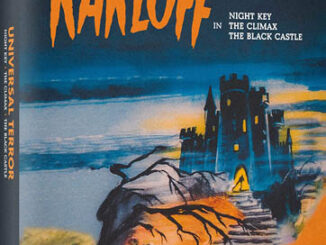
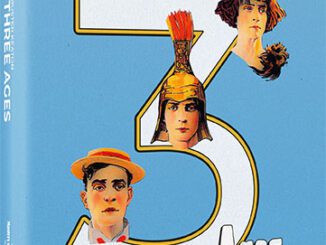
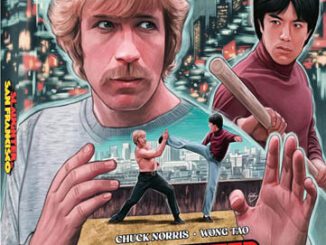
Be the first to comment